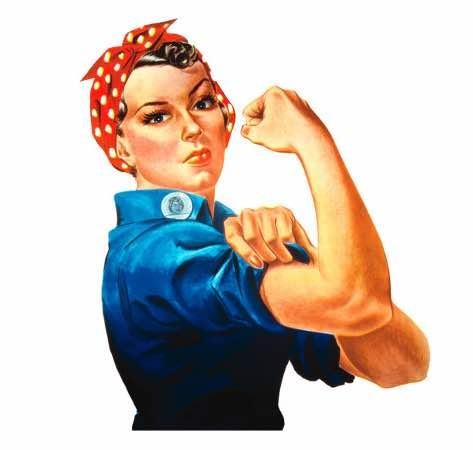Am I a feminist? My whole, half century life as a professional, a wife, a mother of two and now a women’s leadership advocate I’ve never had a comfortable answer to this question. While this might seem odd since I now run a women’s site, I know more women who feel this ambivalence about identifying as a feminist than those who don’t. Maybe you feel this way too. On the brink of Women’s History Month starting tomorrow, I think it’s a good time to take a look at this question more deeply.
Every woman I know in the feminist-ambivalent tribe – myself included – IS grateful for feminism. We are grateful that the women’s movement – grateful for the sacrifices and struggles of suffragettes who got us the vote, feminists who got us into the workplace and helped establish the rights we enjoy to make decisions that affect our bodies. And we deeply appreciate those who keep fighting for our rights against ever-present resistance. Without these ladies’ bravery, strength and dedication I, my contemporaries and our daughters wouldn’t enjoy the freedoms, rights and support we do today. We benefit from this bravery even today, because despite being over half the population, women DO still require the advocacy support in the legal system that is typically required by minority populations.
Through this lens I am a feminist.
And yet, despite my unequivocal support of this legal platform, I struggle with the divisiveness it can cause with the men in my life who also support this platform, but who are sensitive to the anti-male tone it sometimes takes. I am also sensitive to the strident voice that feminism is called to use too often, and I am sensitive to the fact that I believe the promise of feminism will be realized outside the courtroom.
Why I Took A Stand
For a long time I never bothered to put my ambivalence into words, but when I started the InPower Women website last year, I found it difficult to continue that trend, especially since I started this blog to “rewrite the feminist” narrative. I’m definitely doing this so far “from the outside” because – due to the afore-mentioned ambivalence – I’ve never been involved in a feminist organization. So maybe it’s not my narrative to rewrite, but as a beneficiary of the women’s movement, I feel some degree of ownership and even responsibility to help it evolve.
When I started the blog with this mission I made a concerted effort to be clear and positive about what InPower Women stands for, instead of what it doesn’t. This was a deliberate choice on my part because one of the things that often alienates me from many feminist expressions is the negativity and the perpetual attention to what’s wrong until it becomes too easy to lose sight of what’s right. I believe that when we state what we want and what we are in positive terms it reinforces our power instead of our powerlessness and so I choose that positivity-oriented narrative for this blog.
Spending too much energy on injustice at some point tends to reinforce our feelings of oppression. I believe that the most needed response to the kind of injustice women experience today is for women themselves to take full advantage of the freedoms we have, and to free ourselves from non-legislated cultural inequities, many of which live in our own heads and hearts. That’s what InPower is all about and I’m dedicating my professional life to helping you access what’s yours, living inside you. The most powerful response to today’s injustices is to use your personal power to assertively work for the change in the world you want to see. While I hope many women will put their world-changing energies into political reform and working to protect and extend women’s rights, that’s not my personal priority. My personal mission to change the world is to support you in claiming your power to do so. For the most succinct statement of my point of view on this, watch my TEDx video:
My challenge to label myself a feminist was angels on a principled pinhead until I entered into conversation with Gloria Feldt recently, a proud feminist I admire greatly and feel very aligned with (read my favorite post of hers). In our conversation Gloria happened to notice my ambivalence, as expressed in some of my writing where I said “I’m not a feminist” and she wisely challenged me to define myself by what I am instead of what I’m not. While I’d taken an assertive stand for the principles I advocate for the site, I’d been avoiding the question of politicizing labels but I realize the time has come to dig deep and decide exactly what to call the bundle of my beliefs. I owe that much to Gloria and all the other women who have, and continue to, risk much for our rights and freedoms.
I am a Feminist and a Genderist
Dear Gloria,
You ask me if I’m a feminist and I can say unequivocally that since I align deeply with the most closely-held feminist objective of advocating for women to be treated equally under the law and in our culture, yes, I am a feminist. I choose to focus my own brand of feminism on advocating the benefits equality will bring for women, the men who love them and a society that will have access to a larger, more motivated, more capable and more powerful pool of human resources. I choose not perpetuate the woman vs. man dualistic dialog and ineffective analysis of “why” we are in the predicament we’re in because it is simply too easy for this attention to drama to slip into self-victimization.
When it comes to advocating for women’s political rights, I am a feminist, but realizing a woman-only vision of equality for women isn’t enough for me. My personal vision of equality includes men, people of color and anyone else marginalized by the dominant culture. Women now have enough power in our world that as we take our equal place in society in the years ahead we will either extend many of the same inequities and injustices we’ve experienced – allocating them more equally between women and men – or we will transform the culture to value and thrive on what women bring to the table. To me, this means fighting as hard for paternity leave as it does for maternity leave, fighting for gay men and trafficked boys – alongside their female counterparts – to receive better protection and support under the law and for equal pay practices that benefit women and men alike. It means supporting a woman’s legal choice to control her body and equal opportunity for men to gain child custody for the children she decides to have but can’t take care of.
In addition, my brand of feminism includes an assertive effort for older generations of women to take a mature approach to mentoring – and being reverse mentored – by the beautiful and strong young women growing into their power among us. Expecting these young women to be grateful and advising them to succeed the way we did isn’t going to help the cause, them or us. No, we didn’t have that kind of mentor, but we can become that kind of mentor to them, and I believe it’s our responsibility to do so.
I don’t know what to call this kind of feminism and so until I know better, I will call myself a genderist. I am a feminist and a genderist. I believe in the power of gendership and supporting traditional “women’s rights” as human rights, in partnership and friendship with each other across generations and with men.
If I am going to call myself a feminist, it’s with this broader agenda than just women’s rights that takes us into the human rights realm. I appreciate the fact that you stuck to your guns to pull this platform out of me. You are truly a woman of principle and this is a dialog that needs to be surfaced and expanded beyond us to include women and men everywhere.
Yours InPower,
Dana Theus
What Say You?
In the interest of continuing this important dialog, I am offering up the InPower Women platform to host a series of discussions on modern feminism. What would you like to talk about? What are the “pros and cons” of being a feminist and what does this mean for the future of this important platform? How do you – or do you – apply the feminist label to yourself? What does feminism mean to you? What difference does this dialog make in your life, if any? How do you think we should include men in the conversation more effectively?
Watch this space for more discussion on this topic and remember we always welcome your own stories, too.
Guide to Women in Leadership
Organizations with women in their executive suites regularly out-perform others. Yet rising female executives (and their mentors) are frustrated at how hard it is to break through the glass ceiling. In this extensive guide, Executive Coach Dana Theus shares her tried and true strategies to help women excel into higher levels of leadership and achieve their executive potential.







